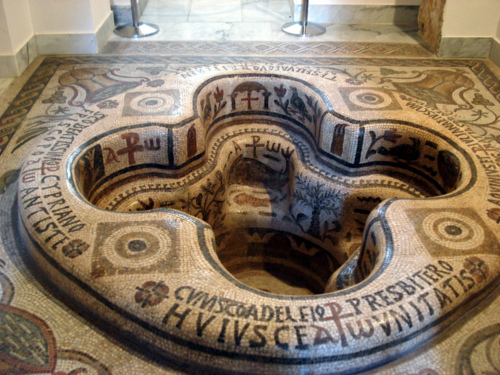Although it is a little late in the day to post this, today is the feast day of St. Damian Molokai, a Belgian priest of the Sacred Hearts Fathers who volunteered to be sent to Honolulu, Hawaii in 1873 to care for the lepers there. In his mission to the lepers in Hawaii, Fr. Damian contracted leprosy himself, which he died from in 1885. Today, Saint Damien is the patron saint of lepers and outcasts and the unofficial patron of those with HIV and AIDS. The world’s only Catholic chapel dedicated to who suffer from HIV/AIDS, the Église Saint-Pierre-Apôtre in Montreal, Quebec is consecrated to Saint Damien.
The subject of HIV/AIDS is frequently invoked as an opportunity to criticize the Roman Catholic Church, particularly regarding the magisterial teaching against condom use. Particularly controversial are statements like those from the late Colombian Cardinal Alfonso Trujillo (the former president of the Pontifical Council for the Family) arguing that the distribution of condoms could make the AIDS epidemic worse by promoting sexual promiscuity despite the fact that condoms are not 100% effective at preventing the spread of the disease:
“The Aids virus is roughly 450 times smaller than the spermatozoon. The spermatozoon can easily pass through the ‘net’ that is formed by the condom.
“These margins of uncertainty… should represent an obligation on the part of the health ministries and all these campaigns to act in the same way as they do with regard to cigarettes, which they state to be a danger.”
It goes without saying that Trujillo’s comments were condemned, and many used statements like these to argue that the Church was actually partially responsible for the spread of HIV, especially in places like Southern Africa. These are important criticisms which I hope are one day addressed on the pages of this blog.
On this feast of St. Damian, however, we are reminded that the fight against epidemics like HIV/AIDS is much bigger than the debate about condoms (important as that debate may be). And while the Church might not be the paradigm of an effective philosophy of prevention, the Church has, in emulating this spirit of Saint Damien, tried to articulate a more comprehensive moral and theological response to the HIV/AIDS epidemic, stressing especially the importance of human dignity and the love and compassion of God.
“Made in God’s image and likeness, every human person is of inestimable worth. All human life is sacred, and its dignity must be respected and protected” (The Many Faces of AIDS). Just as Saint Damian’s lepers were ostracized from society, and dehumanized by systemic discrimination against them, so too do we see this same discrimination taking place against those with HIV/AIDS. Even in this country, where we assume people can live openly with an HIV status, many still live in isolation and in secret. I was amazed recently as I was searching for an article on HIV/AIDS to assign my students, to see an “anonymous” article about a women’s own experience losing her mother to HIV. She explains her decisive to remain anonymous:
Unfortunately, because of the social stigma and misunderstanding about AIDS, the names and places have been changed. It hurts me to have to do this, but I want people to understand the isolation and anguish people with AIDS–and their families–endure because society has made it difficult for them to be open about their illness.”
But the Church’s emphasis on human dignity goes beyond discrimination to encompass also the need for responsibility and personal behavior change:
In the context of the AIDS epidemic, we all need to affirm healthy relationships rooted in trust, honesty, and respect. HIV/AIDS touches upon the issues of sexuality and sexual orientation, substance abuse and addictions, often in a context of poverty, racism, and sexism. The Church’s statements remind HIV-infected persons of their grave moral responsibility not to expose others to the virus. All people are encouraged to respect the dignity of others, both in their personal feelings and interactions and in the structures of society.
Another emphasis we see in the Church’s response to HIV/AIDS, one also rooted in the life of St. Damien, is the importance of God’s mercy and compassion. Compassion, etymologically, comes from the Latin “to suffer with.” St. Damien suffered with those whom he served, going so far as to contract leprosy himself. Now, by no means should we think that the faith calls us to contract HIV, but St. Damian’s actions reflect powerfully the compassion of God who sent his only Son to share in our sufferings and who calls us to also enter into solidarity in the spirit of compassion with those who are suffering among us today: “As members of the Church and society, we have a responsibility to stand in solidarity with and reach out with compassion and understanding to those exposed to or experiencing this disease. We must provide spiritual and pastoral care as well as medical and social services for them and support for their families and friends” (The Many Faces of AIDS). Compassion involves bearing the burden of those who suffer around us, of entering into an intimate relationship with them, of simply being with them in times of trial: “HIV/AIDS causes great suffering and death. And so the Church teachings address this sober reality, helping people to stand before the mystery of suffering and to realize that even here God’s tender mercies can be experienced. The teachings neither downplay the immensity of the suffering nor promote a passive acceptance. Rather the teachings urge all Christians to model their lives after Jesus, trusting in God, bringing comfort to those in need, and confronting oppressive structures and situations.”
None of this is to downplay the potential problems and tensions in the Church’s response to the HIV/AIDS epidemic. But on this feast of St. Damien, we are reminded that a comprehensive moral response to HIV/AIDS demands so much more than a simple affirmation of condoms. HIV/AIDS demands that we recognize and affirm the dignity of all and that we enter into compassionate solidarity with those who suffer in addition to working for effective means of prevention and the transformation of unjust social structures which lead to the spread of the illness. May the spirit of St. Damian inspire us to continue working to not only prevent the spread of HIV, but also to love and care for those who are currently suffering.




Trackbacks/Pingbacks